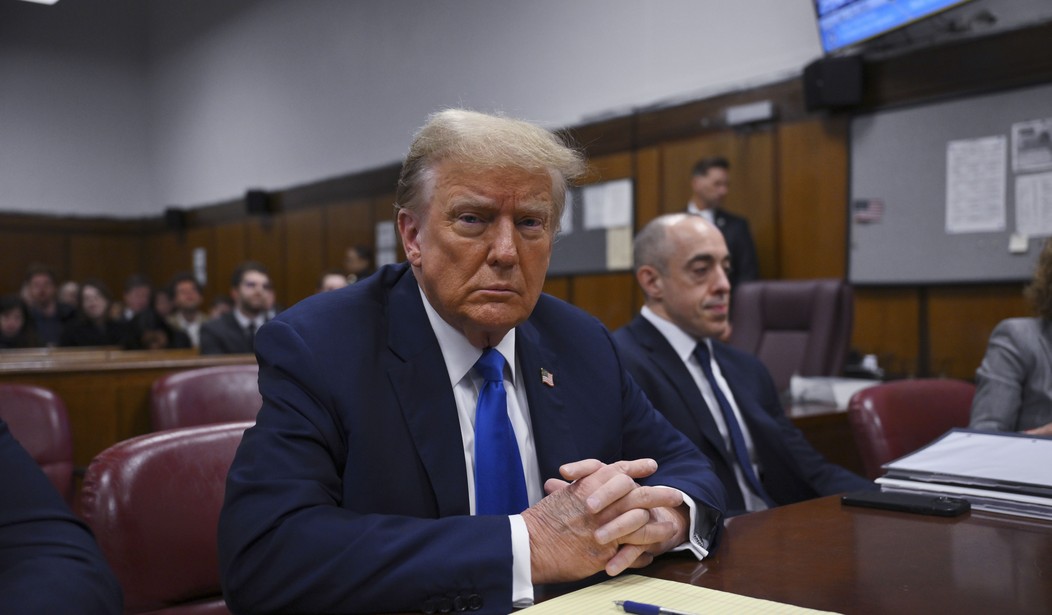Covering former President Donald Trump's trial on television is a difficult job. There are no cameras in the courtroom, so TV news has to rely on quick messages from staffers watching the trial in an overflow room in the Manhattan courthouse where Trump is being tried for making false bookkeeping entries concerning a nondisclosure agreement he had with the porn actress Stormy Daniels.
Without being able to televise the proceedings, some news networks that are committed to wall-to-wall coverage of the trial -- primarily CNN and MSNBC -- are reduced to filling the time with talk. A lot of talk. Judging by the first day's coverage, they're not satisfied with devoting hours of airtime to a discussion of bookkeeping minutiae, so they have moved on to expansive theorizing about how Trump might have "interfered" with the 2016 election by allegedly paying Daniels to keep quiet about their alleged sexual encounter.
If you're following the trial, you might notice that a lot of the commentary sounds alike. Many pundits have jumped on to the false bookkeeping "election interference" train and tend to say the same things that their colleagues are saying. There's a reason for some of that uniformity.
On Tuesday, Politico published a story revealing the existence of a weekly Zoom call that includes "some of the country's most well-known legal and political commentators." The call is "an exclusive weekly digital salon," wrote Ankush Khardori, "whose existence has not been previously reported, for prominent legal analysts and progressive and conservative anti-Trump lawyers and pundits. Every Friday, they meet on Zoom to hash out the latest twists and turns in the Trump legal saga -- and intellectually stress-test the arguments facing Trump on his journey through the American legal system."
Recommended
The key phrase is "anti-Trump." When group members stress-test arguments, they're trying to find the arguments that will be most effective in bringing down Trump. That's what it is about.
The group includes names you will recognize if you watch CNN or MSNBC a lot: Andrew Weissmann, George Conway, Bill Kristol, Norm Eisen, Laurence Tribe, Barbara McQuade, Joyce White Vance, Jennifer Rubin, Mary McCord, Harry Litman, Elliot Williams, Asha Rangappa, Norm Ornstein, Renato Mariotti, Shan Wu, Ryan Goodman, Karen Agnifilo, Jeffrey Toobin and more.
Some are famous. Weissmann was the notorious "pit bull" working for Russiagate special counsel Robert Mueller who was frustrated by the investigation that in the end did not get Trump. Conway is a high-end lawyer who has been dabbling in lawfare for years, most recently in offering assistance to E. Jean Carroll in her case against Trump. Kristol is a Democratic activist and fundraiser who targets his former conservative colleagues. Toobin was a longtime New Yorker and CNN legal analyst before he famously blew up his career on a Zoom call with colleagues in October 2020.
And so on. Khardori, a former federal prosecutor, called the group "the perfect emblem of today's Trump-media-legal-industrial complex." The long effort to topple Trump has become a career for some. "For them, this is a unique opportunity to ... obtain a level of public recognition and stature that few lawyers can ever attain," Khardori wrote. "The people on this call ... are essential cogs in that system, helping to generate and shape content for Trump-hungry consumers."
In other words, the call is a strategic tool that can help participants bring down Trump and get famous, too. Win-win! But it's not something participants want to talk about. Indeed, Khardori said he reached out for comment to everyone whose name was mentioned in the story, and "none spoke on the record." Some apparently talked off the record, but they had to remain anonymous because they had promised the group to keep the Zoom sessions a secret.
One darkly amusing aspect of this is that a major reason the participants don't want the call to become public knowledge is that it would tend to support Trump's contention that he is being targeted by what he calls the "fake news" media. "As I was reporting this story, I learned that some members of the group were understandably anxious about its publication," Khardori wrote. "Trump has claimed that there is a legal conspiracy against him, and there is a risk that news of a group such as this could give Trump and his allies an attractive target."
Imagine that. Of course Trump and his allies will criticize the group. In the case of the current Trump trial and its attendant TV talkathon, the participants are doing precisely what the earlier Russia-Trump collusion groupthink chorus did -- trying to convince millions of viewers and readers that Trump is guilty of a serious crime when, in fact, the evidence against him is flimsy and the case against him is ill-conceived. And it does not matter whether Trump loses or wins the Manhattan trial -- the groupthinkers will just move on to the next case.
*Note: I am a Fox News contributor.

























Join the conversation as a VIP Member